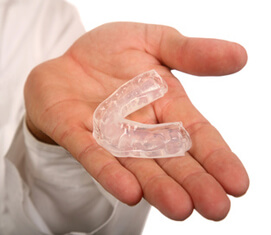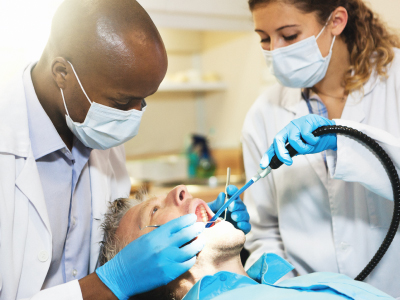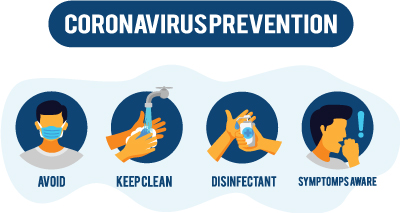Night Guards (Splint)
Get Fitted for Mouth Guards in San Antonio

Protect your teeth during rigorous play with a custom-designed mouth guard. A properly fitted mouth guard protects not only your teeth, but your gums and jaw. South Park Family Dental Care can create mouth guards out of flexible plastic and mould it to fit the shape of your teeth. We recommend the use of mouth guards during hockey, baseball, basketball, football, soccer, or any other activities where your mouth may get hit.
Night Guards – Occlusal Splints
In addition to sports mouth guards, South Park Family Dental Care creates custom night guards and splints. The most common reason for wearing a night guard is to prevent bruxism or teeth grinding. Bruxism can also refer to the act of clenching your top and bottom teeth together during the night. Often bruxism can lead to jaw disorders, headaches, and damaged teeth. If you suffer from grinding or clenching your teeth at night, consider getting a flexible, custom-made night guard today.
Keep your smile safe and ask South Park Family Dental Care in San Antonio about creating your mouth guard.
Athletic Mouthguards
A single blow to the mouth or jaw can cause serious dental damage that is very painful and expensive to treat. You can minimize the risk of this type of injury by using a mouthguard when you take part in sports and other recreational activities.
Mouthguards are resilient appliances that fit over your teeth. When worn during sports activities, mouthguards help protect against injuries to the teeth and other areas in and around your mouth.
The risk of this kind of injury is commonly associated with contact sports, such as football, rugby, hockey, and boxing. However, dental and other mouth injuries may also occur as a result of contact with people or objects during many other athletic activities, including basketball, soccer, squash, gymnastics, skateboarding, and taekwondo.
While the number of mouth injuries caused by sports activities is relatively low, the cost of these injuries is relatively high, especially if there is damage to the teeth. Depending on the type and extent of a dental injury, a single blow to the mouth may result in months or even years of treatment, with costs ranging from hundreds to thousands of dollars.
How Mouthguards Protect You
When you are hit in the mouth or jaw, a mouthguard acts as a cushion that redistributes the force of the blow, so the impact is absorbed more evenly. A mouthguard also provides a barrier between your teeth and the soft tissue in and around your mouth. Many studies have shown that mouthguards help prevent chipped or broken teeth and protect against cuts to lips, gums, and other soft tissue in the mouth area.
Some studies claim that mouthguards may also help prevent other types of injuries, such as concussion, cerebral hemorrhage (bleeding from a ruptured blood vessel in the brain), and neck injuries. At present, the scientific evidence supporting these claims is not conclusive. However, the Canadian Academy of Sports Medicine (CASM) issued a Position Statement in 2004 suggesting that mouthguards should be worn during participation in soccer “for the definite dental protection they provide and the possible role in concussion prevention.” See the Need More Info? the section below for more information on the CASM Statement.
Types of Mouthguards
There are three main types of athletic mouthguards:
Stock mouthguards
These are ready-made. You simply place the appliance in your mouth and use it “as is.” You can buy these in stores that sell sporting goods. They are also sold over the Internet.
Boil-and-bite mouth guards
These are made from materials that are resilient under normal conditions but become pliable when heated. You place this type of mouthguard into very hot water until it softens, and then bite into it so it will take the shape of your mouth and fit more closely over your teeth. Like stock mouthguards, these are sold in sporting goods stores and over the Internet.
Custom-made mouthguards
These are prescribed and fitted by a dental professional. The process involves making a model of your teeth and then molding the mouthguard material around the dental model to ensure a close and comfortable fit.
Occlusal splints
Special mouthguards designed to protect your teeth against nighttime teeth grinding – also known as bruxism. Occlusal splints work by limiting your jaw muscle movement while you sleep, and provide protection from any grinding you subconsciously do. You can buy over the counter occlusal splints, or you can have one custom-fitted by your dentist. As noted above, a custom fit usually provides better comfort and protection.
Choosing a Mouthguard
Mouthguards vary in terms of cost, comfort, and effectiveness. The ideal mouthguard is durable, resilient, and comfortable. It should fit properly, be easy to clean, and should not affect your ability to breathe or speak.
Here are some facts to consider when choosing a mouthguard:
- Stock mouthguards are typically the least expensive. They offer some protection, but they do not grip the teeth, and it can be difficult to keep them in place unless you bite down on them constantly.
- Boil-and-bite models fit more closely around the teeth and this makes it easier to keep them in place. However, when you bite into the hot mouthguard to give it the right shape, you reduce the thickness of the device. This, in turn, may reduce the level of protection.
- Custom-made mouthguards are the most expensive, but they have a better fit, which means better protection and more comfort.
If you or your children wear braces or other fixed orthodontic appliances, it is especially important to have a mouthguard that fits properly. Otherwise, a blow to the mouth can damage the brackets and wires of the braces, and can also cause added damage (cuts and tears) to the soft tissue inside your mouth. Mouthguards are usually worn only on the upper teeth, but people with braces on their lower teeth should consider using mouthguards on both sets of teeth.
Minimizing Your Risk
Mouthguards are a smart investment because they provide valuable insurance against injuries that could cost much more in the long run in – not only in financial terms but also in terms of time and suffering. Protect yourself by using an athletic mouthguard when you take part in activities that pose a risk of injury to your mouth. Choose the model that best suits your needs and your budget. For advice about choosing the right mouthguard for you or your children, consult your dental professional or an official from a sports league or association.
Take proper care of your mouthguard:
- Keep it clean. You can use mild soap and a soft toothbrush. Rinse your mouthguard with cold water or a mouthwash before and after each use.
- Store it in a ventilated, rigid container. Keep it away from heat, including direct sunlight.
Check your mouthguard regularly for wear and tear. Mouthguards become less effective over time and should be replaced when they get torn, or become too loose or too thin.
Do you need a mouthguard?
Mouthguards can be used by anyone. If you play sports – even non-contact sports – we recommend using a mouthguard. If you wake up with headaches, an aching jaw or don’t feel well-rested in the morning, you could be suffering from bruxism, and may benefit from an occlusal splint.
Your dentist is your best resource for finding the best mouthguard for you. An effective mouth guard should be comfortable, durable, easy to clean, and should not obstruct your breathing or speech.
You only have one set of adult teeth, and keeping them as long as you possibly can is the best strategy for your overall oral health.


 We will be disinfecting all counters, door handle and hard surfaces in the waiting room at regular intervals. Also, we will ask all patients to use disinfection wipes that the front desk team members will provide before signing in and checking out. We as a rule disinfect hard surfaces and equipment in our operatories based on infection control guide lines.
We will be disinfecting all counters, door handle and hard surfaces in the waiting room at regular intervals. Also, we will ask all patients to use disinfection wipes that the front desk team members will provide before signing in and checking out. We as a rule disinfect hard surfaces and equipment in our operatories based on infection control guide lines. Please keep your regular dental appointment if you are not ill or have not come into contact with ill patients.
Please keep your regular dental appointment if you are not ill or have not come into contact with ill patients.